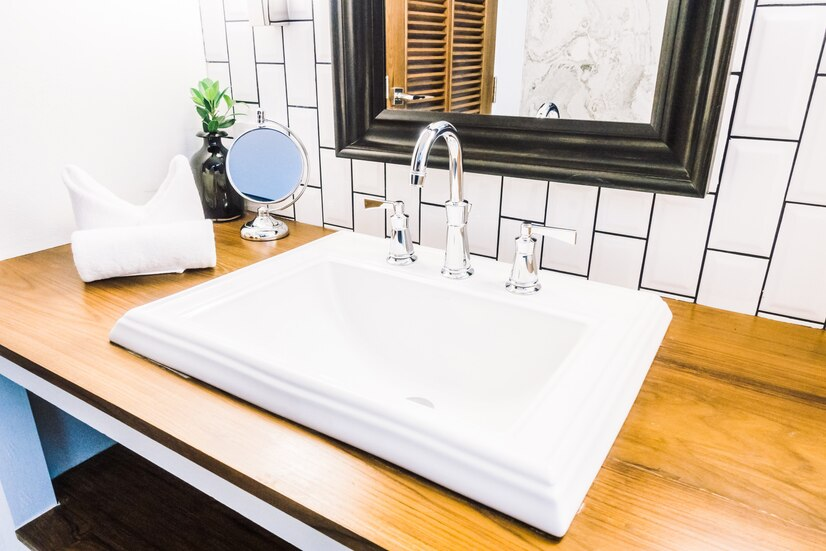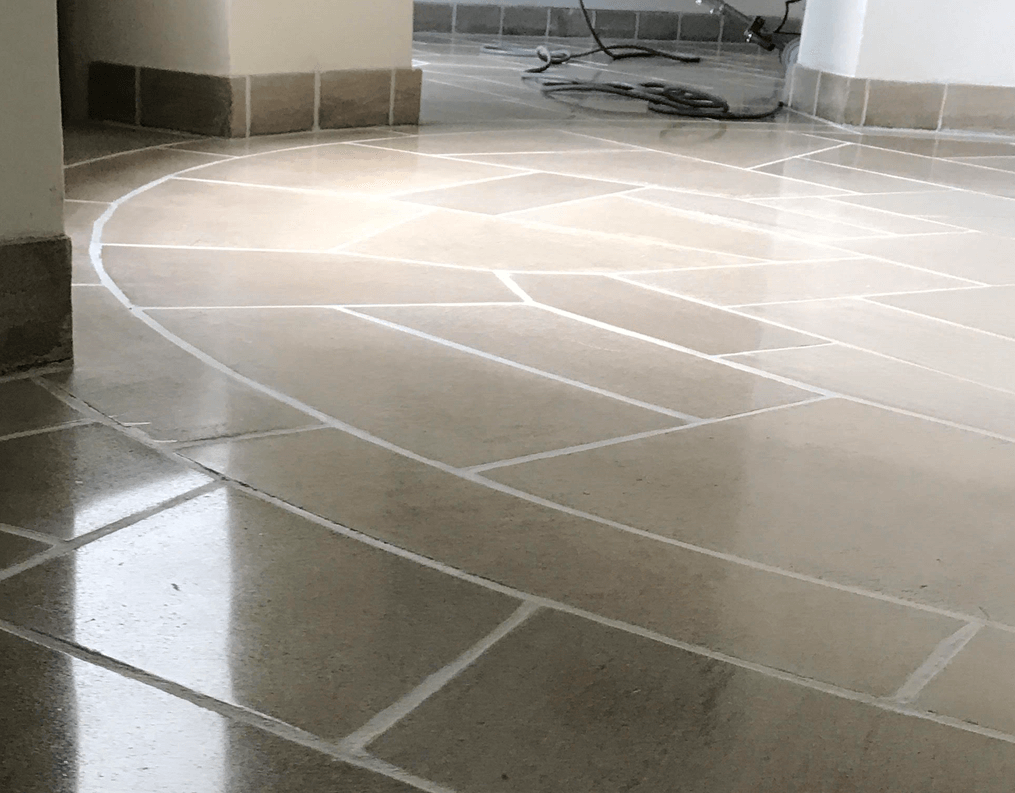
Unlike natural stone countertops like granite or marble, quartz doesn’t need that extra layer of protection. In fact, sealing might cause more trouble than it’s worth due to its non-porous nature.
If you’re thinking about sealing your quartz surface, hold that thought. Scroll further to learn why you shouldn’t seal quartz countertops.
What Really Happens When You Seal a Quartz Countertop?
Sealing quartz countertops doesn’t work the way many people think. Unlike granite and marble countertops that benefit from marble floor restoration, quartz is a non-porous surface, so sealants don’t soak in. They just sit on top. And that’s pointless.
Here’s what really happens:
- The sealant forms a surface layer that may streak or leave a dull film.
- Dirt and grime can get trapped if quartz countertops aren’t cleaned perfectly before sealing.
- Some sealants may react poorly with the resin in quartz countertops due to their harsh chemicals.
Sealing does nothing to boost performance and can create issues you wouldn’t have had otherwise. That’s because quartz, unlike natural stone, lacks pores. It’s like a thick slab of plastic. Why’d you waterproof it?
5 Reasons Why Sealing Quartz Countertops Isn’t Necessary
There are structural, scientific, and obvious reasons not to seal quartz countertops. Let’s look into them.
Non-Porous Surface
Quartz countertops are non-porous by design. Simply put, they don’t have pores. That means they naturally keep spills from soaking in. Coffee, water, or any other liquid sits on the surface until you wipe it off.
Unlike natural stone countertops like granite or marble, quartz doesn’t absorb liquids. There’s no risk of moisture, oils, or wine seeping in and leaving stains.
Sealing is meant to protect porous surfaces. Since quartz countertops aren’t porous, applying a sealant serves no real purpose.
Built-In Protection
Quartz is engineered by combining natural quartz crystals with resins and polymers. This mix creates a tough, sealed surface right out of the factory. The resins bind everything together, making the material strong, smooth, and stain-resistant.
The protective layer is already baked in. So, there’s no need for an extra coating.
Low Maintenance
One of quartz’s biggest perks is its ease of maintenance. A simple wipe with mild dish soap and water keeps it clean, and there’s no need for specialized cleaners or recurring treatments.
Sealing quartz surfaces adds an unnecessary step while making maintenance work lengthy and irksome.
Some sealants may leave streaks or build up over time. Quartz countertops are already hassle-free. You don’t need to call for stone cleaning in Chicago, Northfield, or wherever you live.
Won’t Benefit from Sealants
Adding sealant to quartz countertops is like pouring water into a cup that’s already full. It doesn’t improve performance. Some sealants can cause a dull film or change how the surface reflects light.
Long-Lasting Durability
Quartz countertops are built to last. It easily resists scratches, stains, and daily wear. The engineered surface holds up well in kitchens and bathrooms, where messes and moisture are common.
Sealants don’t make it more durable. They don’t prevent chips, and they won’t protect against heat damage. They don’t need to be sealed.
What you get from the factory is already designed to handle the rough and tumble of daily use. Even lighter shades, like white quartz countertops, are just as tough and stain-resistant.
In short, quartz countertops are already equipped with everything you need: strength, stain resistance, and a sleek finish. Sealing them adds no value and might even cause issues. Stick to regular cleaning, and you’ll have a beautiful quartz countertop for years.
Potential Downsides of Sealing Quartz Surfaces

Sealing quartz countertops can do more harm than good. If you’re planning to do it, read the following downsides.
Residue and Streaking
Quartz countertop sealing can leave behind unwanted residue. Since quartz doesn’t absorb the sealant, the product just sits on the surface. Once it dries, you might notice streaks or a cloudy film that dulls the finish.
Removing that residue can take extra scrubbing or specialty products. It’s an extra hassle that wasn’t needed in the first place.
Surface Damage
Some sealants contain harsh chemicals that aren’t meant for quartz counters. Applying the wrong product can actually damage the surface over time. It might lead to discoloration, or worse, interfere with the factory-applied finish.
Instead of protecting your countertop, the sealant may degrade the surface and shorten its lifespan. Quartz countertops are already engineered to be strong. Adding sealant just risks messing that up.
Wasted Time and Money
Quartz countertops sealing takes time, effort, and cash, and it doesn’t give you anything in return. You spend money on the product, follow a long application process, and wait for it to cure. And then? Nothing.
The performance of your countertop remains exactly the same. There’s no added benefit, just lost time and wasted dollars.
Trapped Contaminants
If the surface isn’t perfectly clean before sealing, dirt or bacteria can get trapped under the sealant. Once sealed in, these contaminants can be hard to remove.
This defeats the purpose of trying to keep your surface hygienic. Instead of making things safer or cleaner, sealing can backfire and create a hidden mess.
Bottom line: Sealing quartz countertops doesn’t help, but it can definitely hurt. You’re better off skipping it and letting your countertop do what it was made to do.
Benefits of Skipping the Sealant on Quartz Countertops
Some things are worth skipping, like quartz countertops sealing. If you don’t do it, you’ll receive the following benefits.
Maintains Hygienic Surface
Quartz is non-porous, unlike its natural stone counterparts, preventing bacteria and liquids from seeping in. That’s a huge win for hygiene.
Even white quartz countertops, which some think are delicate, hold up quite well against moisture and stains.
Skipping the sealant helps keep this natural barrier intact. When you add a layer of sealant, you risk creating a sticky surface that holds onto grime. Let quartz do what it’s built for. Stay clean with just a quick wipe.
Warranty Stays Valid
Most quartz countertops’ warranties clearly state that applying sealants or coatings can void coverage. Manufacturers design quartz to perform without added products.
If something goes wrong and your countertop was sealed, you may be left without support. If you avoid sealants, you protect your investment and keep the warranty intact.
Saves Time and Money
Sealing takes time. It’s a whole process from cleaning the surface, applying the product, waiting for it to cure, and buffing it down. And for quartz countertops, it’s all unnecessary. You’re buying and using products that serve no purpose.
No Risk of Surface Damage
Some sealants can react badly with the resin in quartz countertops, resulting in discoloration, streaks, or a sticky texture. In some cases, the finish may become uneven or dull. So leave the surface as-is to avoid these risks completely. They don’t need to be sealed.
Quartz countertops are made to be tough. Don’t let sealants mess with that.
Conclusion
To make your granite countertop shiny, you don’t call a concrete floor polishing service, right? That’s irrelevant. Similarly, sealants are irrelevant for quartz countertops. They work well on natural stone surfaces. But if you seal quartz countertops with them, you’ll create a mess.
The surface is already engineered to resist stains, spills, and bacteria, so relax after the installation. It doesn’t need to be sealed.



